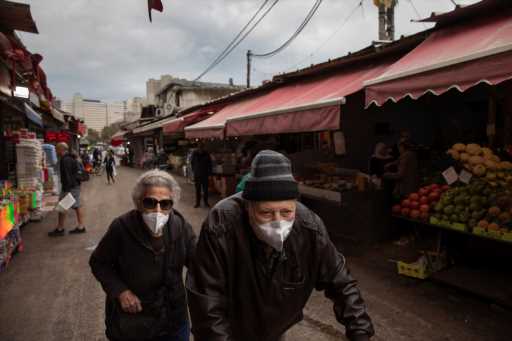JERUSALEM — The head of Israel’s shadowy Shin Bet internal security service said Tuesday that his agency received Cabinet approval overnight to start deploying the agency’s phone surveillance technology to help curb the spread of the new coronavirus in Israel, a move that sparked widespread criticism from lawmakers and civil rights groups.
While Nadav Argaman acknowledged that using the agency’s counter-terrorism capabilities to track sick Israeli citizens deviates from Shin Bet’s typical operations against Palestinian militants, he said the goal was still in line with its overall mission of “saving lives.”
The move was announced by Prime Minister Benjamin Netanyahu as part of a series of sweeping measures to stop the outbreak and immediately raised concerns from civil-liberties advocates that the practice would raise serious privacy issues.
On Tuesday, in a live televised announcement, Netanyahu said the technology had indeed been deployed, calling the strategy “critical” to slowing the outbreak.
The final go-ahead also came the day a new Israeli legislature was sworn in following the country’s third election in less than a year — meaning it bypassed the typically required oversight of a special parliamentary subcommittee that had already begun reviewing the measures.
Argaman vowed there would be stringent oversight to maintain individual privacy and that operatives would only use their geolocation findings from cellphones and credit card use to warn those that may be exposed to the virus — rather than enforcing any government-mandated quarantine.
“The other state bodies don’t have the necessary technological means to aid this effort,” Argaman said in a statement. “I am well aware of the sensitivity of this matter and therefore have instructed that only a very limited number of agents will be handling this and the information will not be saved in the Shin Bet database.”
Still, criticism over the move and its unchecked approval was swift.
Gabi Ashkenazi, a retired military chief who headed the special parliamentary subcommittee in the outgoing parliament, called the government approval a “heist in the dead of night.” His centrist Blue and White party chief and fellow retired military chief, Benny Gantz, also criticized the move.
“These are exceptional times that, unfortunately, call for exceptional measures in order to save lives. That said, we cannot surrender transparency and oversight,” said Gantz, Netanyahu’s chief rival in the elections. “A functional parliament, even and especially in states of emergency, is a hallmark of democracy and we will be steadfast in preserving it.”
Netanyahu rejected the comments, saying that delaying the deployment of the measures could “lead to the deaths of a great many Israelis.”
Netanyahu acknowledged the technology had never been used before on civilians and would involve a certain degree of violation of privacy. But he said the unprecedented health threat posed by the virus justified its use.
“These means will help us greatly in locating the ill and thus stopping the spread of the virus,” he said in a televised announcement. “We will approve these digital tools for a limited period of 30 days. Israel is a democracy and we have to balance individual rights with the greater needs of all.”
Among various other measures, Israeli health officials have put out public advisories ordering tens of thousands of people into protective home quarantine.
The new tactic looked to use mobile-phone tracking technology and a review of credit card data to give a far more precise history of an infected person’s movements before they were diagnosed and identify people who might have been exposed. Those in jeopardy would then be notified by text message to self-quarantine.
The only other place believed to have used similar technology to fight the coronavirus pandemic is Taiwan, where the government used mobile phones to make sure infected people do not leave their quarantine. Netanyahu’s office insisted the Shin Bet would not be involved in enforcing quarantine orders against sick patients and that all its actions would be shared with health authorities and overseen by legal experts.
Eugene Kontorovich, a law professor at George Mason University and director of international law at the Jerusalem-based Kohelet Policy Forum, said the Israeli measure was justified and legal and should serve as a model for the United States.
“During this and other epidemics, the government has the right to curtail many fundamental liberties,” he said. “One person’s rights end where they begin to endanger others. This information is used to save lives, by finding people who have been unwittingly exposed and may be spreading disease.”
Still, Israel’s Supreme Court has agreed to hear a challenge over the move, which has sparked a heated debate over the use of sensitive security technology.
The lead editorial on Tuesday in the liberal Haaretz daily warned that the fight against the new virus in Israel was threatening individual rights.
“The state should not determine the locations of law-abiding citizens, whose only crime is to be infected by the coronavirus,” it wrote. “In emergency situations, governments have an even greater responsibility than usual not to violate the checks and balances that are the foundation of the democratic system.”
Source: Read Full Article
